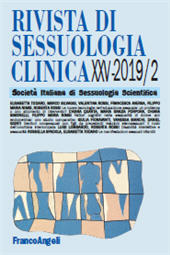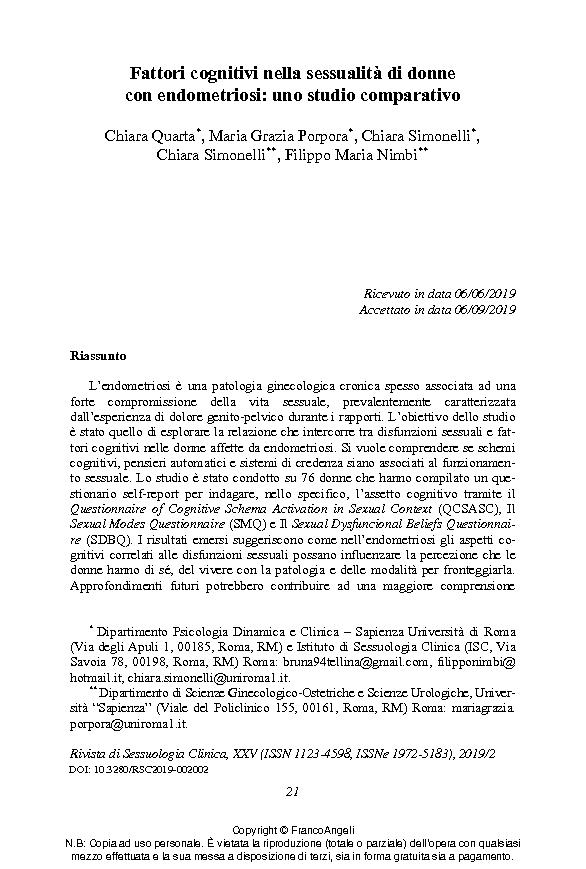2019 - Franco Angeli
Articolo
Versione Digitale
Download | Copia/incolla | Stampa
Fattori cognitivi nella sessualità di donne con endometriosi : uno studio comparativo
21-38 p.
- L'endometriosi è una patologia ginecologica cronica spesso associata ad una forte compromissione della vita sessuale, prevalentemente caratterizzata dall'esperienza di dolore genitopelvico durante i rapporti. L'obiettivo dello studio è stato quello di esplorare la relazione che intercorre tra disfunzioni sessuali e fattori cognitivi nelle donne affette da endometriosi. Si vuole comprendere se schemi cognitivi, pensieri automatici e sistemi di credenza siano associati al funzionamento sessuale. Lo studio è stato condotto su 76 donne che hanno compilato un questionario selfreport per indagare, nello specifico, l'assetto cognitivo tramite il Questionnaire of Cognitive Schema Activation in Sexual Context (QCSASC), Il Sexual Modes Questionnaire (SMQ) e Il Sexual Dysfuncional Beliefs Questionnaire (SDBQ). I risultati emersi suggeriscono come nell'endometriosi gli aspetti cognitivi correlati alle disfunzioni sessuali possano influenzare la percezione che le donne hanno di sé,
- del vivere con la patologia e delle modalità per fronteggiarla. Approfondimenti futuri potrebbero contribuire ad una maggiore comprensione dell'impatto che questa patologia ha sul benessere sessuale, sulla qualità della vita, e così indirizzare verso un intervento più appropriato ed efficace. [Testo dell'editore].
- Endometriosis is a chronic gynecological disease often associated with a strong impairment of sexual life, mainly characterized by the experience of genitalpelvic pain during intercourses. The literature highlighted that endometriosis mainly affects the female reproductive system and, therefore, has a strong impact on sexuality, on gender identity, on the quality of a woman's relational and mental life. The present study arises from the intention to deepen the cognitive health situation of women with endometriosis. The aim of the current study was to explore the relationship between sexual functioning and cognitive factors in women with endometriosis. In particular, we focused on the association of sexual functioning to cognitive schemas, automatic thoughts and sexual dysfunctional beliefs. Data were collected in two groups of women: 35 patients in childbearing age (age range 1845 years, M=34.83 SD=7.70) with a diagnosis of endometriosis (verified by laparoscopy) belonging to the department of Gynecology
- Obstetrics of the Policlinico Umberto I and 41 healthy women from the general population. The women completed a selfreport questionnaire assessing cognitive structures through the Questionnaire of Cognitive Schema Activation in Sexual Context (QCSASC), the Sexual Modes Questionnaire (SMQ) and the Sexual Dysfunctional Beliefs Questionnaire (SDBQ). In the analysis of the data emerged from the QCSASC, women with endometriosis showed a greater activation of negative cognitive patterns related to the sense of impotence compared to the control group. This result could be linked to the data emerging on the access to seek help for sexual problems: only 26.7% of women in the clinical group with sexual difficulties underwent or have undergone a specialist consultation in the past, compared to 80% of women in the control group. It is reasonable that women with endometriosis have more difficulties in seeking help, maybe because of the rigid and dysfunctional cognitive schemes related to the sense of impotence on their
- condition. The women from the clinical group reported a greater number of beliefs related to "sexual conservatism" and a tendency towards the "affection primacy" component. In the literature, conservative attitudes towards sexuality and unrealistic expectations about sexual performance are commonly associated with sexual difficulties in women and men. In conclusion, the results of our study seem to indicate that in endometriosis the cognitive aspects related to sexual dysfunctions may play an important role in influencing the perception what a woman is experiencing, of her identity and of her relational situation. Further indepth investigations could contribute to a better understanding of the impact that this pathology has on sexual health, on the quality of life and thus direct towards a more appropriate targeted intervention under the biopsychosocial model. [Publisher's text].
Fa parte di
Rivista di sessuologia clinica : 2, 2019-
Informazioni
Codice DOI: 10.3280/RSC2019-002002
ISSN: 1972-5183
PAROLE CHIAVE
- Endometriosi, sessualità, schemi cognitivi, pensieri automatici, si-stemi di credenza
- Endometriosis, sexuality, cognitive schemes, automatic thoughts, belief systems
-
Nello stesso fascicolo
- Le nuove tecnologie nell'educazione sessuale : un problema o uno strumento di intervento?
- Fattori cognitivi nella sessualità di donne con endometriosi : uno studio comparativo
- Genitori omosessuali con figli da precedenti relazioni eterosessuali : il ruolo dell'omofobia interiorizzata
- Disabilità intellettive e sessualità
- Le manifestazioni sessuali infantili
- Recensioni
- Segnalazioni bibliografiche
- Convegni



